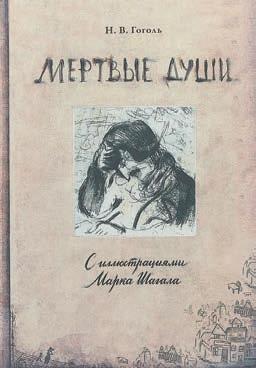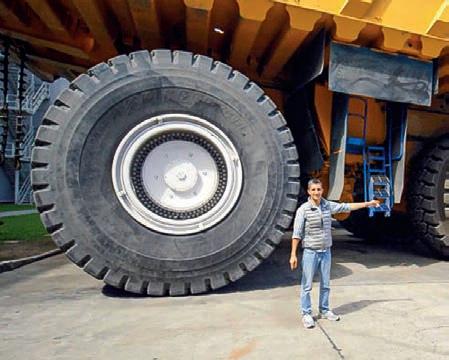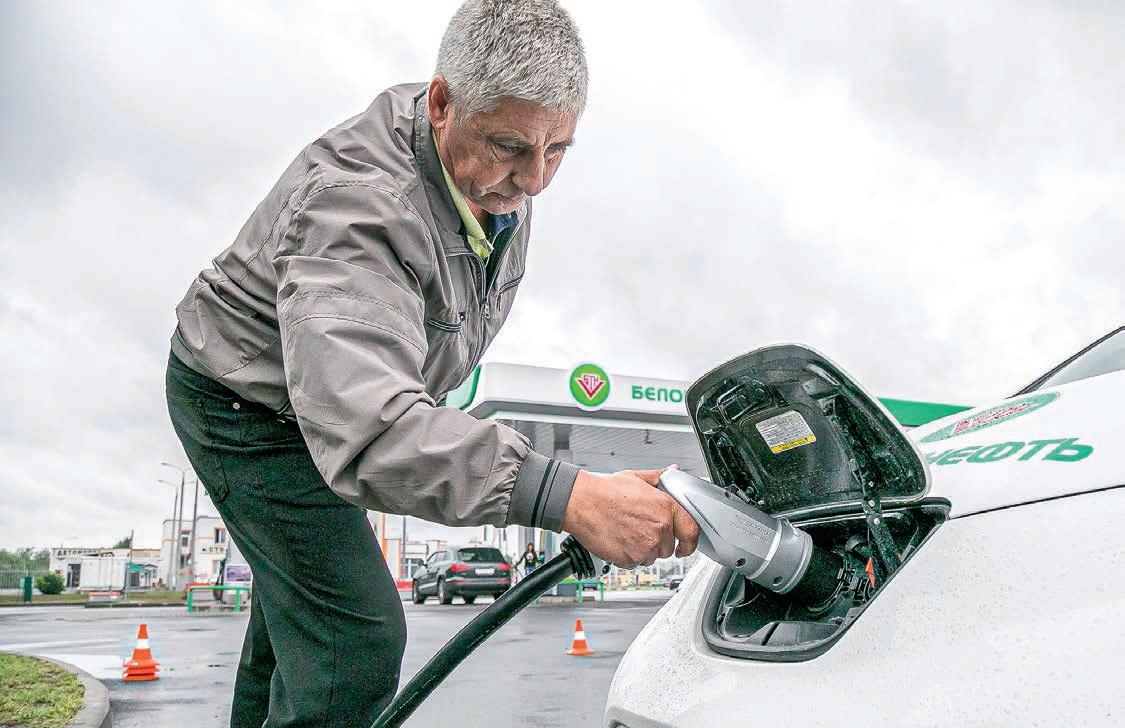
77 minute read
Line of personal protection
1 prof
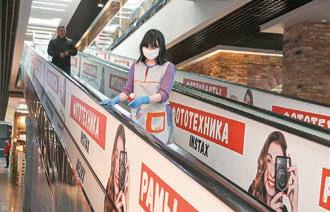
Advertisement
Belta
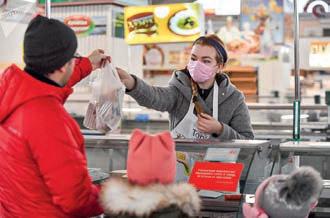
sp ut nik
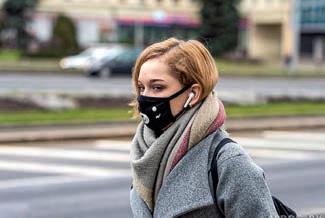
Belta
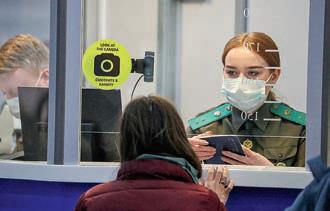
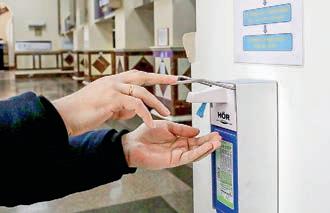
In Belarus, sensible precaution is available
Line of personalprotection
T“The growth of mental illness is a global trend. Belarusians suffer from them not more often and not less often than residents of other countries”,— said Alexander Startsev, director of the Republican Scientific Practical Center for Mental Health, chief consultant psy‑ chiatrist of the Ministry of Health, in one of his interviews. “The only differ‑ ence is that in the West, a personal psy‑ chotherapist is the standard of life, and we are only coming to understand the need for psychological support”. I agree, it is not customary in our society to di‑ agnose one’s emotional experiences. On this occasion, there is even a comic catch phrase applied to the mentality of Bela‑ rusians: “Maybe it should be so?” Nev‑ ertheless, according to statistics, over the past 10–12 years, the increase in vis‑ its to specialists in connection with men‑ tal illness has grown by 14%. However, this is not directly related to the deterio‑ ration of the mental state of Belarusians. Life expectancy and, for example, the number of pensioners with dementia have increased. In addition, many peo‑ ple begin to realize that difficult times are easier to overcome with the support of a qualified specialist. And now, dur‑ ing the period of global stress caused by the coronavirus, it is especially impor‑ tant to monitor your physical and men‑ tal health.
How to save it in the era of informa‑ tional intoxication and excessive emo‑ tional stress — we are talking about this w ith Vladislav Ivanovsky, an experienced psychiatrist-narcologist at the Minsk City Psychiatric Outpatient Clinic, a special‑ ist who has successfully been using many m ethods in the treatment of mental dis‑ orders for 25 years, i. e. neuro-linguistic programming, hypnosis, Gestalt therapy, bodily-provocative, family and group therapy… About anxieties and fears — Vladislav, many of my friends, having learned about the new virus pandemic, are seriously panicking. And in g eneral, judging by the news, the reaction of the world community was unexpectedly stormy. Why do you think most p eople are depressed, hysterical? —In the poem by Nikolay Nekra‑ sov “A little man the size of thumb”, t here are such lines: “And stalking along in a dignified manner, and lead‑ ing the horse by the bridle ahead”. This “li ttle man” is a six-year-old child who directs a cart loaded with firewood, walking along a snowy slippery road. One wrong movement of the boy and the cart can slide into the ditch, turn over, and break. That’s why he controls every step, every action, knowing that he will be responsible for the conse‑ quences. Six years old child, and he is How to maintain a sound mind in a sound body during the raging pandemic of coronavirus? What to look for in order not to succumb to panic and despair? How to help yourself and what is the role of awareness in our lives? About this and a little about love to fellow beings — all this is in an interview with Vladislav Ivanovsky, a well-known psychotherapist and narcologist at the Minsk City Psychiatric Outpatient Clinic.
already quite mature! By the age of fif‑ teen, he will be a real man: he won’t say a word, he will analyze everything, be‑ cause he is the foundation of the family, t he foundation of this world.
If children were raised like this now, there would be no chaos you are talking about. Everyone would be aware of the responsibility for the spoken word and action, for the consequences, for other people. But this is not taught. Eighteen –year -olds are still children, not accus‑ tomed to responsibility. The teacher calls mom and asks: where is your son? And the mother, instead of doing her work, is looking for her 16‑year -old son. Be‑ cause it is believed that at this age chil‑ dren are not responsible for themselves.
When I was 6 years old, I traveled by public transport across the city for do‑ ing sport. I bought food for the whole family since childhood. If I didn’t buy it, everyone would be hungry, I under‑ stood that. I supervised the sisters to do their homework. And no conflicts in the family! Because a man is responsi‑ ble for the emotions of all women in his house. Their psyche is different — they are emotional, it’s difficult for them to stop… Mom, by the way, is also a wom‑ an. And she should to treat her son like a man. And not to show that she has un‑ limited rights to him. Otherwise, what will become of such a son? No man. This is where the fuss, anxiety and stu‑ pid actions of adults come from. — That is, responsibility must be taught from childhood… —Yes, you have to be persistent and have a habit of analyzing the consequenc‑ es, that is, to think. And now it often hap‑ pens that emotions get the best of us — a nd here we go. People have to know in practice, who and what should and must do, not in theory. However, the current rules do not allow parents to bring up their children the way their fathers and grandfathers used to do in the past. And it leads to what, for example, France faced 15 years ago. Children came to school and slept on their desks till 12 o’clock in the afternoon. Teachers had no right to kick them out of class, no right to give them a bad mark.. Why were they sleeping? Be‑ cause they had been online until 3–4 a. m. in their rooms behind closed doors. Mom and Dad had no right to enter. But the one who has no right to punish isn’t an authority, it’s the law of psychology. The experience of someone you’re not look‑ ing up to, is worth nothing. It means, t hat the experience of all previous gen‑ erations, alas, has no historical signifi‑ cance for the new generation. And then w hat about the knowledge of the war, at which, as Vladimir Vysotsky said, people manifest themselves, come to understand what really matters in life? Unfortunately, our veterans are more silent. My grandfa‑ ther, a major, went through the war. After t he victory, my mother told me, colonels, lieutenant colonels gathered together and cried. They recollected the dead. —Of course, the horrors of that time cannot be described in words. But it’s still necessary to talk about it, you’ll agree. So that knowledge of the world is not made up by the modern generation. Fortunately, every year children get involved in d ifferent events dedicated to the Victory Day. For example, the school, where m y children study, takes part in the town contest of patriotic photos: pupils dressed in military uniform are photographed together with a war veteran. B esides, youth flash mobs, in which schoolchildren and students take part, have been held all over the country for several years. By the way, do veterans come to you? —There are not many of them left. They come in connection with age problems, dementia. Psycho-traumas, sustained on the battlefield, have be‑ come for them normal life. But there are young ones, for example, those who went through Afghanistan war. Some of them find it difficult to return to normal life after what they saw in the war. — Who comes to you most often and with what problems? —Mostly Minskers, 80% are wom‑ en aged 22–50. They are more inclined to discuss their problems. Women have a much bigger brain area responsible for speech. The problems are all roughly the same and interrelated: mood decline, depression, anxiety… — I f a person is depressed, is it possible to help him? I know examples from life when two people had to separate because one psychologically pulled the other to the bottom. It’s not always possible to help: mistrustfulness, weak will — there may be different reasons. Staying close to one another is also unbearable when the eternal melancholy reigns in the house… — It reminded me of the situation, which my acquaintance psychologist from the United States told me about. If you get a job in a big corporation in the US, you must undergo psychologi‑
Vladislav Ivanovsky

cal testing. In the feedback form there is a question: the ship is wrecked, you and the child are on board. There is only one place for rescue, who will you seat: yourself or the child? If you choose a child, you will not be hired, because you do not understand that the adult will be saved and can give birth to another child. The child will die anyway, and you’re deliberately destroying yourself. But it’s my deep belief that this kind of logic leads to self-destruction. How can you live knowing that you survived at the cost of your child’s life? You can’t run away from your instincts, and life won’t be nice anymore. Then what’s the use of saving yourself? The same is in your situation. If a person is depressed,
he or she is not feeling well. If his or her “computer” got hung up, and my soft‑ ware works, do you think two comput‑ ers have a chance of restoring the first? “But if I fail to do it, will I get hung up, too?” — It’s an egoist’s reflection. You fail to help by yourself, take a person to a psychologist. — F orced isolation of Belarusian citizens, judging by the numerous posts on social networks, has revealed another problem, i. e. t he feeling of loneliness. What if you feel that nobody needs you? —There is an anecdote on the top‑ ic: a woman sits crying. A boy comes u p, asks: why are you crying, aunt? She, sobbing, answers: “Nobody wants
me!” — “Did you ask everyone?” Go to the orphanage, spend some time there. Spend your knowledge and energy on someone. You’ll immediately have a feel‑ ing of happiness in life. Milton Erickson des cribed the case of his patient in one of his books. She was depressed, felt that nobody needed her. Having noticed beautiful flowers on the window-sills, the doctor prescribed her to send a flow‑ er to everyone she knew. After a month, hi s help was no longer needed: the lady had set up a flower company. How did it happen? It turned out that when she sent flowers, she received pleasant compli‑ ments in return. A circle of communica‑ tion appeared. They started to advise on h ow to grow flowers — the patient was a good florist. As a result, half the country needed her! So, she felt the joy of life. —Recently I saw a video where Italian psychiatrists ask people not to panic, if suddenly they have a desire to talk with inanimate objects at home. They say there’s nothing wrong with such monologues. It’s bad if the objects respond… Funny, of course, but the problem of obsessive thoughts has long been known. How do you get rid of internal monologues? — Stop running away from them. The inner monologue doesn’t happen all of a sudden. The brain is smart. If it spends its power on thinking something over and over again, then it really mat‑
Psychologist is always a helping hand
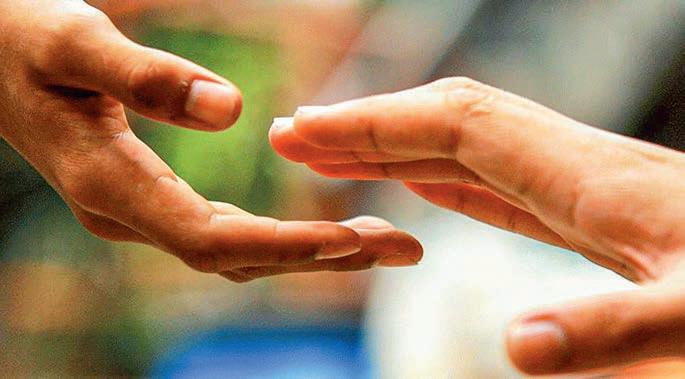
ters. Don’t be afraid to look inside your‑ self, there’s nothing wrong with it. The main thing is not to fight with yourself, but to listen and accept. And then it turns out that happiness is close. — C an you always be happy, without a reason? — Of course! There will always be suffering, just do not focus on it. Op‑ timists see a lot of good things around t hem. Pessimists see only bad sides of it. Both of them are right. But one mind has no room for the whole world, our mind is quite small. There’s a lot more informa‑ tion. So we have to choose. We can enjoy e verything that exists at the present time. This, by the way, is from Gestalt-therapy: to teach people to rejoice at what they already have, not to fantasize about pos‑ sible future, or to recollect endlessly the p ast. If you are as attentive as possible to what is happening now — what a busy life it is! Then we do not just sit and talk with you. We also nourish each other with pleasant emotions. If you see the meaning in every little thing, then you endlessly enjoy life. And also, never lie to yourself. Chronic deception is imposed on us every step of the way. —Speaking of deception… Advertisers, marketers know how to draw attention. Sometimes a person does not even realize why he or she acquires this or that thing, service; he or she does not notice how much they depend on the Internet, on social networks. What is it, a choice without choice? So, human beings are spineless creatures? —N o, of course they aren’t. It’s just that they have their own logic of think‑ ing. Or patterns, as Sigmund Freud said. We don’t think what muscle to strain to make a sound or when we move. In the same way we get used to the pattern of thinking. If we make the same choice a couple of times, why analyze again and again, let’s say, its effectiveness? To use the perception pattern is to save energy. But at the same time, it also increases the chances of error. Is it bad? No, it’s not. It’s personal experience. No one ever learns from someone else’s mistakes. Only if you intimidate a person so much that he or she is afraid to take a step on their own. But such a person is already, excuse me, defective. He or she was not allowed to be alive, to think, to feel everything at once… When I talk about it with pa‑ tients, they are confused: is it possible to feel everything at once? To listen and hear through your skin, muscles, bones, joints… We have to! To be aware of one’s own sensations means to grasp the clues of the subconscious, whose database is many times, thousands of times larger than the database of consciousness. Your own body wants to help you. Un‑ fortunately, people lose the ability to feel themselves since childhood. — Are you talking about mindfulness?
— Of course, children should be taught this kind of mindfulness. To be able to understand their feelings, the life of the inner world. If you learn to perceive the environment with each cell, then you will assess what is happen‑ ing in the world in a different way. And there’s less chance for error. — I h eard that mental disorders came first, overtaking cardiovascular and cancer. That’s global statistics. Why do people continue to suffer, despite the fact that life has become more comfortable and any pleasure can be bought without even leaving home? — On e can’t buy sincere love. One can’t build a trusting, caring, real rela‑ tionship for money. Alas, wealth does not make a man harmonious.
About love
—Doctor, what is love? There are many definitions of love, I’d like to hear yours… — I t’s a selfless desire to do good. When we don’t expect gratitude in re‑ turn. I just want you to feel good. — But’as long as a man lives, so does his ego”? — No two egos are alike. There’s a concept of healthy egoism. When I feel good because you feel good. I do it for myself. But there’s no obvious contradic‑ tion in this scheme: “give -and-take”. And to guess how to make you feel good, I need to take your measure, to understand you. Why is she looking at me point -b lank, not blinking, tilting her head to one side? What does she feel? It’s not much but you are already involved. So, you can’t hurt me and yourself at the same time. If everybody learns to understand another person, it will turn out that there are no scoundrels, everyone is good. But it’s a difficult skill — to feel the other, you have to acquire it from childhood. — I think you have heard the phrase: love lives for four years. Does it? —If you mean hormones, it’s even too long! But there’s a nuance. A clas‑ sic example: a woman says she chose a partner because of his beautiful hair. “What a fool I was! Who knew he’d turn out to be such a fool!” But his smells, his gestures, the way he walks and dresses, the volume of his voice and the pause in his speech, the way he talks — it’s all a huge layer of coded information, bio‑ logical, psychological and genetic! Her subconscious instantly counted and analyzed it all: whether he matches her, what other options she has and can be in the world. In the end, the con‑ clusion was: you must take him! And the consciousness deciphered it: he has beautiful hair. The choice does not happen by chance, there is no apparent spontaneity. one” for “another” because “I’m not used to conform to anybody.” There will be problems with the next one, too. And then the next one and the next one… And we should understand a person, his soul: what’s going on inside there? If you approach the relationship from this position, it becomes very interesting. Be‑ cause it turns out that inside there is a w hole world, a unique one. There is no copy of it, not only physiological, but also psychological. If you invest your strength, time, experience, money in your partner, he or she will become the dearest to you.. You can’t draw a line be‑ tween us. Physically, it seems to exist,
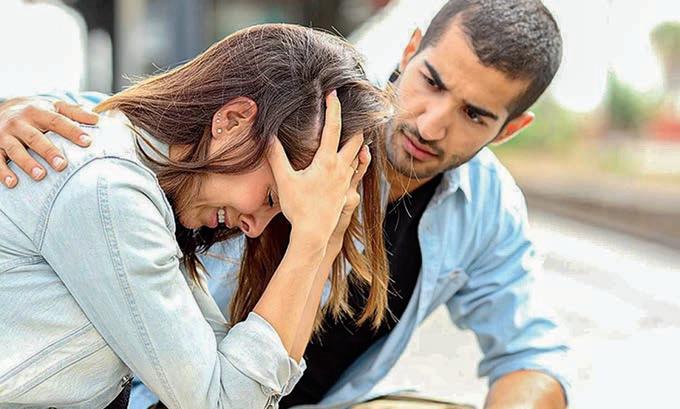
— And why doesn’t she like his hair anymore? —Because there are no 100% match‑ ing couples. They always don’t fit togeth‑ er in something. But it was less impor‑ tant for her subconscious than all the r est. And now they’re living together, she doesn’t get something from him. What should be done? To do something to get it. Change your habits, acquire new skills — change a lot of things in your‑ self, and to take him for who he is. But t his is work! Who wants to work? No‑ body! It’s easier to blame him for every‑ thing: I got a “defective” one, it’s his fault t hat I feel bad. Yes, family life provokes a lot of situations that either make you better or worse. But we just change “this
The photo is illustrative
b ut mentally, it doesn’t. I’d better die, but won’t give him or her back — he or she is mine! Once a man came to me. He said: I have tried so much, so much has hap‑ pened, I seem to have everything, and s till something is wrong… We began to analyze what was missing. It turned out, the depths. It turned out that he shouldn’t have been into diversity, but the depth of feeling! And it’s not by chance that a per‑ son meets on his way this very person. —You’re talking about perfect, biblical love. But there are different stories in life when one person falls into dependence on another, when the relations are built on money and benefits… However, it doesn’t work as in Belarus there is one divorce in two marriages.
—Love is a skill. One can learn it. But it’s hard work. Especially when the potential is low: imagine a child, whom the mother gave to an orphanage… We can’t do without love. The Americans have proven that. They conducted an experiment: perfectly fed a group of monkeys, created good hygienic en‑ vironment, entertained them. Every‑ thing except touching, caressing them. I n the second group the monkeys had the same conditions, but they were touched, stroked. In the first group, most of them died. Those who survived did not rise above the average level of development. And the monkeys in the second group didn’t fall ill, gained weight well, their level of development was high. It is important for everybody to be looked into the eyes, to be smiled to, to be noticed. On an instinctive level, it means: I am important, I have a place in the sun. These are biologi ‑ cal things, more precisely, ethological t hings (ethology is the science of ani‑ mal genetic behavior — Auth.). And t hrough addiction, people try to make up for what they don’t get. And they get attached to someone to get more. But this is not the only way, on the contrary, it’s a surrogate. If you feel harmonious, any addiction will dissolve. — If everyone becomes self-sufficient, won’t the desire to interact with each other disappear? — N o, it won’t. Because a single per‑ son won’t survive! We feel bad alone, no matter how we fool ourselves.
About a healthy lifestyle
— Vladislav, everyone knows how important it is to eat properly, to sleep and exercise. But many people still don’t sleep enough, work hard and don’t want to walk at least around the house — they are tired. The society does not disapprove of it. But if I reschedule the meeting because I didn’t get enough sleep the night before, I’m unlikely to be understood at work. —Any society is focused primarily on the functioning of the system, not on the health of its individual “parti‑ cles”. If an individual behaves more ac‑ tively, that’s a plus for society. What is t he goal? To be effective. Of course, it is encouraged! And the fact that a mem‑ ber of society ruins his or her health — i t’s their personal business. And our personal task is to look after ourselves. We can stay awake, without food… But then, and I’ve talked about it thou‑ sands of times, the potential of the b rain is decreasing, the chances for er‑ ror are increasing. In the end, it’s not p rofitable! So we start thinking… So, as the song sings: think for yourself, decide for yourself whether to have it or not. —And is it possible to sleep a little, while staying effective? — According to historical docu‑ ments, Napoleone Buonaparte, who s upposedly slept little and scolded those who slept a lot, used to take a nap in his carriage while moving from one place to another. So it’s unknown for certain how many hours he slept in total. The need for sleep is most often about 8 hours. But the total amount of sleep should be theoretically divid‑ ed into three parts, i. e. six hours for night sleep, at about 11 a.m.— another half an hour or an hour, and at about 4:00 p. m.— a little more. In this case, the potential of the nervous system is maximum: electromagnetic parameters of the brain are the same as for animals. And the physiological processes will work better, too. A nuance: You should sleep at least an hour before 24:00! Or better two. Every night, the nervous system reboots. If a person is awake until midnight, only the body part is renewed. No matter how busy you are, lie down and get some sleep. Then get up at 1:00 a. m. and work until morn ‑ ing. When the night shifts were intro‑ duced at the weaving mills, there was a s urge in infertility, hormonal disorders. Sleep deprivation is catastrophic for the body: it takes two and a half months of regular sleep to make up for a single 30‑minute sleep deprivation. —Why is it that we can’t sleep?
—More often than not, it’s because the nervous system is overexcited. The very first thing that I would recom‑ mend in this case is to “feed” the nerv‑ ous system with missing vitamins, trace elements. It will harmonize itself, adjust the inhibition processes necessary for sleep. Sleeplessness may also be associ‑ ated with body problems. There can be an inflammatory process in the GIT. It may cause no pain, but there are signals to the brain about the malfunction. — What kind of exercise is best for the brain? — D o what you like. It’s good be‑ cause endorphins are produced. — Vl adislav, psychology is called the science about the soul. But it does not fit at all into the theory of human origin… —At school I always listened atten‑ tively to the biology teacher and did not un derstand why she contradicted her‑ self. And now I understand that it’s not s he who contradicted, but science itself. I can’t explain many quite obvious things. The further science develops, the more arguments appear that human origin has a divine character. It all comes down to the fact that God exists. I may be very much mistaken, but I personally came to this conclusion based on logical reason‑ ing of scientific facts. I don’t really feel t hat He exists. But I do know it. And I think any thinking person comes to this conclusion sooner or later. It’s true that the previous system of knowledge is collapsing. But Darwin’s theory wasn’t proved. His colleagues even laughed at him because the scientist couldn’t fit a bunch of facts into his theory. He just ig‑ nored them. Although I don’t argue, D arwin’s theory is convenient. Accord‑ ing to it, there’s nothing after death. It’s a bout momentary pleasures in life, not about perfection of the soul. Then we need to buy another iPhone although the old one’s still working well. And a car, a wife, a country… And if there is some‑ thing after death, the psychology of con‑ sumption does not fit into our lives at all, i t is awfully stupid. Do you agree? Interviewed by Alisa Gungor
Mustafa Ozcan:
OOur conversation was taking place in an informal, friendly atmosphere. We didn’t touch upon business issues, and talked about life, about children, hobbies, cuisine, as well as about the peculiarities of the Turkish and Belarusian mentality. We drank fragrant tea in a Turkish man‑ ner, the habit we got into during our va‑ cation in Turkey, from traditional glasses. We were interested to know what kind of person arrived in Belarus, and for Mr. Ambassador, it was clearly seen, it was also important to understand who was in front of him.
“We have had a very interesting con‑ versation with you, during which I didn’t get tired at all”, — he told us, smiling when a two-hour conversation came to an end. Of course, it was nice to hear these words. After all, it was interesting to talk to him, listening to the music of the Turkish lan‑ guage.
And how happy was Mr. Ambassador when he learnt that in the summer we had visited Oludeniz, not far from Fethiye. And he said: “There are hundreds of in ‑ teresting, amazing places in Turkey, and y ou chose one the very right of them! A worthy place where with high culture including a domestic one.” He admitted that he also loved that region, where his friends lived. “My fam ily a nd I are l iving in thec ountr y tha t has s urpassed our e xpec tation s ”
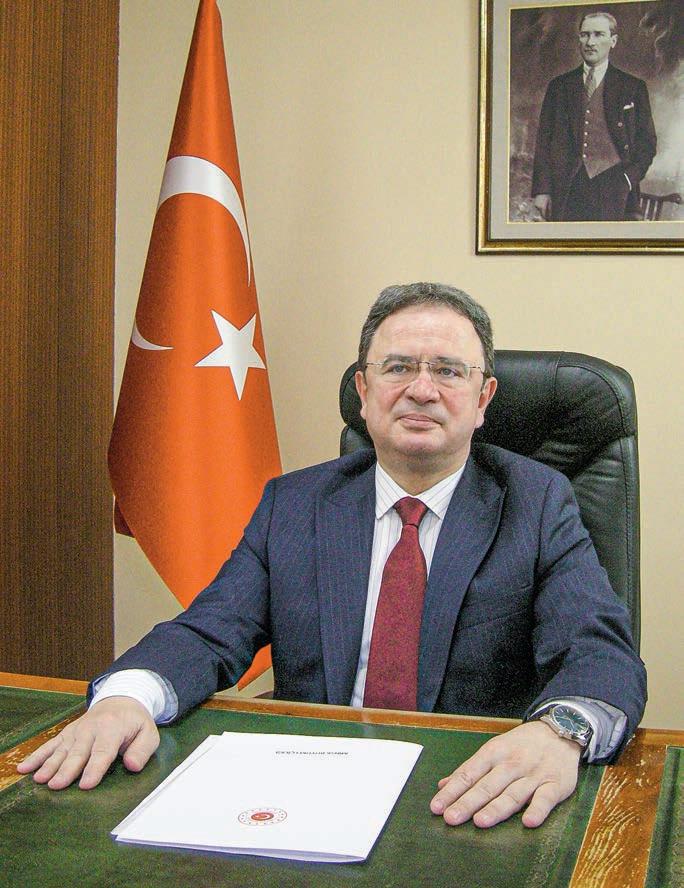
Talking with Mr. Ambassador, we no‑ ticed his genuine interest in the country where he had been posted to, about which he wanted to learn as much as possible. — Congratulations, Mr. Ambassador, on your arrival in our country. We really hope that you will like this place, and will feel sorry to leave it. —I’m even sure that it will be so. Ab‑ solutely sure! — We know that prior to this appointment, you worked in the Office of the Turkish Foreign Ministry, before that as a diplomat in Azerbaijan, Germany, Ireland, and the Permanent Representative of Turkey to the World Trade Organiza
tion. What do you think, Mr. Ambassador, is the most important thing in diplomacy of your level? — In its classical understanding, di‑ plomacy involves building and developing o f relations between states and between the peoples of these states, as well as re ‑ solving possible disagreements and con‑ flicts in a peaceful way. At the same time, di plomacy has a representative function. In my opinion, diplomacy is an art that contains a number of views, positions of a political, legal, humanitarian nature. It also presupposes that diplomats have a certain amount of knowledge and experience in each of these areas. Diplomacy, again, like art, bears its fruit, its results, either good or different from the expected ones. And since we are talking about classical diplo ‑ macy as building relations between states, h owe v er, we should not forget that empha‑ sis of diplomacy, nevertheless, is placed on a person. And I want to say that for me this is exactly so. Because all our initia ‑ tives, agreements or the inability to agree, a ll our successes or failures in this field lead to the fact that an ordinary person will ex ‑ perience the benefit or harm from such ac tivities. Therefore, Turkey as a state used as a basis such an approach, such a vision as humanistic diplomacy. And if you want an example of such an approach, that is, humanistic diplomacy, I will give the most striking example. Over the years, Turkey has over the years been receiving about 4 million displaced people in its territory. In fact, this is a heavy burden, which the Re ‑ public of Turkey took upon itself. The ex‑ penses connected with so many displaced p eople staying in the country exceed $40 billion. These funds are raised by the Re ‑ public of Turkey from its own resources. N o meaningful outside assistance is pro‑ vided in this matter. And the main prin‑ ciple of Turkish diplomacy, which has not c hanged throughout time, is a well-known saying “Peace in the country means world peace”. Since the great leader and creator of the Republic of Turkey Mustafa Kemal Atatürk uttered this phrase as a fundamen ‑ tal principle for himself and for the repub‑ lic he created, our priority in resolving all co nflicts and disagreements is always this peaceful principle. We always try to resolve the contradictions at the negotiating table. And until the external challenges that re ‑ late to our national security force us to the wa ll. We prefer not to resort to brute force. —In your contacts with people, what is important for you, Mr. Ambassador, in the perception of a person: intuition or logic? — Both. Of course, I try to logically understand and comprehend what the other person is telling me. But of course, I also turn to feelings. Moreover, there is such a thing: body language. Non-verbal communication. Both for us, and for peo‑ ples related to the Turks who actively use it, this is also an important means of es‑ tablishing contact and communication. By the way, I noticed upon arrival in Bela‑ rus that here people are actively using the language of non-verbal communication. And it pleased me, it allowed me to quick‑ ly adapt. In no country before, except, perhaps, Azerbaijan, culture, including linguistic, is so similar to Turkish, I could not adapt so quickly. And here it took me a short time. I have been with you since January 15. — Pr obably, some plans in connection with the coronavirus have to be changed? — U nfortunately, last month passed against the backdrop of the events with coronavirus, which does not allow us to fully focus on the development of rela‑ tions. In particular, the arrival of some delegations from Turkey had to be post‑ poned. We had to cancel or reschedule a series of events that had been planned here. Despite a rather dynamic start in af‑ fairs, I had to slow down a little. At the same time, watching the way Belarus is fighting against coronavirus infection, I want to express my approval of the actions that are being taken here. Everything is done clearly, in no way people panic, events are not exaggerated. At the same time, all necessary measures are being taken. Thus, Belarus compares very favorably with sev‑ eral other countries. And the country has taken all the important, significant meas‑ ures, which are noted and praised by the World Health Organization.
— Please tell us about the time when you felt safe, surrounded by the care of your parents. About your family. — Thanks for that question. It gives me a chance to plunge into a happy past, to recollect my childhood. I was born in Istanbul and lived till I was 10 years old in the area the name of which came from the name of one of the rulers of the Ottoman Empire, i.e. the great padishah Fatih Sul‑ tan Mehmet. This is the district of Fatih. My childhood passed among the legacy of the Byzantine Empire: near Ayasofya — Hagia Sophia, Valens Aqueduct — the city’s water supply system and also close to an Ottoman masterpiece — magnifi‑ cent Topkapı Palace museum and many mosques. I was very lucky with the place of birth and with my parents! My father was a trader. His workplace, office was located in the European part of Istanbul, in Besiktas district on the Bosporus coast. You may have heard that we also have a football club with the same name: Besik‑ tas. And I am a very devoted fan of this particular team. — Y es, we know of this district of Istanbul a little by Turkish feature films but have not yet been able to see city yet. Our friends, who in summer returned from there, became loyal fans of Istanbul… — O h, this is a historic city. And I grew up there. The routes of my walks ran alongside palaces, mosques, which keep the memory of great events. I also want to note that I like fishing most of all after my
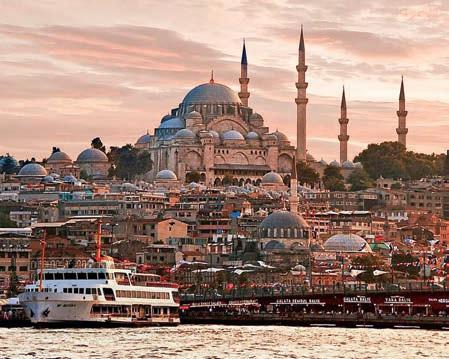
Istanbul's district — Fatih, where Mr. Ambassador spent his childhood
wife and my family. Moreover, this is my hobby that goes back to those fishermen who fish on the coast of the Bosphorus. I watched them many times in my child‑ hood. —Do you fish with a spinning rod? —Yes, with a spinning rod. —From the waterfront? — … Both from the waterfront, and from the boat — I’ve tried all possible ways. — T here are so many opportunities for this in Belarus! — I know! (this word is pronouncing cheerfully in Russian, everyone is laughing.) When I was going to Belarus, I was about to do ice-fishing. But this year there was shortage of ice (laughs). Next year, I hope that winter in Belarus will meet my expectations. — O ur son of daughter-in-law is also fisherfolk, and their children grew up with fishing and spinning rods in their hands. And Bogdan is a talented craftsman and artist. He makes unique prizes for fishing competitions — actually, with a spinning rod. So get ready! The Bosphorus experience will be very useful for you, and plus a little fishing luck… And our love for Turkey is strengthened by family ties: beautiful children — Yasemin and Damir, whose father is from Turkish Adana — are growing up in Minsk. — That’s good! I hope the children have already been to Turkey? — Sure. They’ve brought a lot of best impressions from there! — They are the brightest in childhood. I remember, for example, that my broth‑ ers were fans of the “Fenerbahçe” football club, which is associated with the Kadıköy district in the Asian part of Istanbul — the one on the other side of the Bosporus. So, because of such different football prefer‑ ences, we often quarreled in childhood. — How many brothers do you have? — There are three of us. And our mother did not work, she raised her sons. Although only over the years did I real‑ ize that that was very serious and respon‑ sible work. Imagine: my brothers and I loved football so much that sometimes we played matches right in the room. In the
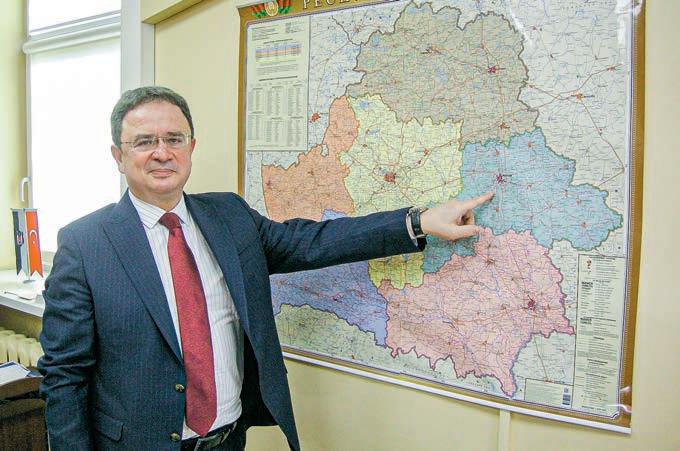
Mr. Ambassador: “Here, in Mogilev, I have already visited the forum “Mogilev-Amasya”
living room! I remember how much glass had to be replaced, different frames… Our children’s mischiefs are still remem‑ bered at home — now with humor. But since I was the eldest, our father took me to work with him during the holidays in order to give a little rest to my mother and relieve tension in the “trio”. That is why, I’ve gained both experience in trade, and, most importantly, in management since an early age. Many other employees worked with my father. They and the cli‑ ents were from different strata of society. Back then I sometimes had to learn to hold a dialogue: to agree on something, to build relationships. I still see big advantages of the experience gained in childhood: not everything can be learned at school. And I still have and hold that old habit. For me it has become a lifestyle: to communicate harmoniously with people. Just like I don’t divide them into kids and adults when I go out. — Were both your father and mother from Istanbul? — M y family arose across two differ‑ ent cultures. Mom comes from a family that moved from Crimea to Istanbul at the time of the collapse of the Ottoman Em‑ pire. And already four generations of this family have been living in Istanbul. And my father comes from Anatolia, from its middle part, from the city of Niğde. By the way, it is also known for its rich cultural heritage. Thus, I absorbed the culture and traditions of both Istanbul and Anatolia in my family. And it manifested itself in eve‑ rything: in the cuisine, in music, in how relations develop in the family and with others. I to a certain extent learned some parts of that vast experience of my for‑ bears. And accepted for myself as a basis. — Wh at was your favorite dish in your parents’ family? — A very difficult question! Especially when it comes to Turkish cuisine. Because there are so many tasty things in it! I’ll start by saying that fish and meat are always my favorite dishes. Now, whatever dish I call, hundreds of other dishes, if they could speak, would ask: why not me? (laughs). Turbot — a fish from a family of flatfish. Guvec meat dish, many types of köfte. And my wife, Elvira, is from Azerbaijan, so a number of dishes from Azerbaijani cuisine also came to the house, to the family. And there are three among them, which I prefer. These are various eggplant dishes. There is a karnıyarık dish (stuffed eggplant). Then pilaf and cacik are served to it — an ayran - b ased drink to which a finely chopped cucumber is added. And when it’s all in a three -course set served, I can’t resist. I like guvec, dry beans, dry meatballs. I really like doner. Iskender ke‑ bap. If I continue to list, you will not be

Mr. Mustafa Ozcan together with the Chairman of the Economy Committee of the Mogilev Regional Executive Committee Dmitry Mudrogelov
able to stop me (laughs). Therefore, I will stop for now. And moreover, it’s almost dinner time (laughs). —People who talk so enthusiastically about food are the ones who love life. It seems you are one of them.. You love life… —Thanks. Life is a gift! I will share a secret with you, since you and I have en‑ tered such an interesting territory. I like to eat, I also like to cook. — T hey say that Turkish men do it exceptionally well? —I t happens, if time permits, I try not to let my cook or my wife into the kitchen. The problem is to find time to cook deli‑ cious food for the loved ones. This process is always comforting. I can say, it appeases me. —And for whom, besides your wife, do you cook? —I have two sons — Kemal and Emir, 14 and 9 years old respectively. —Where do they study? — So that they could quickly adapt, get acquainted with the local culture, we did not send them to a school for foreign‑ ers. They attend one of Minsk schools where education is in Russian language. Belarusian and English languages are taught together with Russian. — Nice to hear! This can be a good example for those citizens of Belarus who find it difficult to learn the Belarusian language. And you probably already know: Belarus is a multinational country. Including the descendants of the Crimean Tatars who have been living here for more than 600 years, since the time of Grand Duke Vytautas. A great number of them settled down here after the great battle with the Crimean Tatars near Kletsk in 1506, thousands of Crimean soldiers were captured. Over time, they settled here, adapted. They brought their culture and at the same time absorbed the local one. — Yes, I know that. By the way, my second line of kinship with the Tatars is through my wife. I repeat, she is from Azerbaijan, her father is Azerbaijani, and her mother is a Kazan, Volga Tatar. —S o your wife must have had a Soviet upbringing? Does she know Russian well? —Yes, she does. Russian is her native language. I wanted to mention it a little bit later. Besides, her life circumstances were such that in 1984–85 my future wife went to kindergarten in Belarus in Kalinkovi‑ chi (the last word is clearly pronounced in Russian). — A pparently, you were meant to be together here! How did you become a diplomat? What influenced this choice?
— I w ill turn back to childhood. I was very fond of watching foreign films back then, I liked to see different countries in them. At that time my uncle — and he was my father’s business partner — went on a long business trip across Europe. And after the trip he told me a lot of interest‑ ing things about what he saw and expe‑ rienced. In high school my friends saw in me the potential of a diplomat. When we were preparing for the graduation, friends in my graduation album wrote to me as a keepsake: “We wish success to our classmate Mustafa Ozcan, who is go‑ ing to become a diplomat”. From the mo‑ ment I graduated from primary school, I was ready to choose this profession, I am choosing it now. I wanted to represent my country abroad, as well as get acquainted with other countries, their cultures, peo‑ ple. Of course, the world of that time was different from the modern one. Now, in order to know other countries, it is no longer necessary to become a diplomat. And at that time there were no mobile phones, there were few TVs. For example, we had a black and white TV which had only one channel. The Internet and social networks were in the distant future.
There were also deep reasons for choosing the diplomatic path. I actually was a child -idealist, and to this day I re‑ main an idealist. I really wanted to fur‑ ther develop friendly, peaceful relations between countries, between nations. I believed that I could implement my ide‑ als in a suitable environment. However, over time I became convinced: the pursuit of the ideal is an extremely difficult task. Nevertheless, it is very important for me not to give in, to exercise due patience on the way to the goal. To work to implement ideals. That’s what I’ve been trying to do to this day. And this is still very important for me. — Is it easy in Turkey to become a career diplomat? — V ery difficult. And it’s not easy to get a job in the ministry — you need to work patiently and with high dedication for years. I feel happy! I’ve managed to achieve the goal that I set for myself at the end of elementary school. Of course,
the experience that I gained thanks to my involvement in the father’s business also helped: I worked with him until I was 24 years old. And then I entered the civil ser‑ vice, i. e . the Ministry of Commerce. I was engaged in trade diplomacy for five years. I was lucky in that. After all, economic and trade diplomacy — as structural parts of big diplomacy — is very important. And I attached great importance to economic and trade diplomacy. This has always been a priority for me. Over time, I left the Min‑ istry of Commerce and joined the Min‑ istry of Foreign Affairs. Thus, I’ve been working in the civil service for 27 years. — H ow did it happen that you were appointed Ambassador to Belarus? — Last year I was informed that I could go to work abroad as Ambassador. I had the opportunity to choose from about 20 countries: at the end of 2019, so many posts of ambassadors were vacated. And when I saw this list, I thought: I wish I could go to Belarus! In Moscow I had been on business and privately and I had worked in Azerbaijan. Post-Soviet coun ‑ tries is the region of the world which I a m interested in. Also thanks to my wife, I knew that Belarus is a wonderful coun ‑ try, and Belarusian people are very sin‑ cere and open. We also know about the r ich history of Belarus, about the feat of Belarusian people during the Second World War. And about the fact that Bela ‑ rus lost one third of the population dur‑ ing the war years. During the years of the es tablishment of the Republic of Turkey, we also had the National Liberation War. It also brought a lot of grief, hardship, human sacrifice. Our people, like Belaru ‑ sians, showed heroism, courage and great de dication. And from this point of view, we see a lot in common between our peo ‑ ples. In addition, Belarus today is a clean, s afe and developed country. My personal number one priority, and my family’s too, was Belarus. According to the tra ‑ dition existing in our Ministry, distin‑ guished Mr. Minister Mevlüt Çavuşoğlu c alled me and announced the country in which I have to work: Belarus. I was very pleased by this. —Is this the fate?
—Yes, no doubt! We all wanted to and it’s happened. This is a very good twist of fate. Thank Allah. A little more than 2 months have passed since the day I arrived in Belarus and now I understand that I was not happy enough when Mr. Minister called me (laughs). In fact, my family and I live in the country that has surpassed our expectations. Everything is wonderful! I’m even looking for something to criti‑ cize — and I fail find it. — W hat is your basic higher education? — In 1990, I graduated from Istanbul University. Faculty of Economics, Depart‑ tion with each other. And a very impor‑ tant, turning point in our relations is the v isit of the distinguished President of the Republic of Turkey Recep Tayyip Erdoğan to Belarus in 2016. And in 2019, distin ‑ guished President Alexander Lukashenko p aid an official visit to Turkey. Over the pe‑ riod between these visits, much has been ac hieved. Something to compensate that previously could not be done. In particular, it can be considered that the legal frame ‑ work necessary for the further develop‑ ment of our relations is completely ready. Th e trade turnover between the countries is growing every year. Both countries im ‑
In the European part of Istanbul — Beşiktaş Mustafa Ozcan in his father's office learned the first lessons of trade

ment of International Relations. Then I studied also in Istanbul at the Marmara University at the Institute of the European Community, attended postgraduate stud‑ ies. This is also in Istanbul. By the way, be‑ fore my career began, my father had sent me to London for two years to learn the language. That was my preparation for the profession. —What issues in cooperation were you focused on by the Ministry when you were appointed to this position? —As you know, the political relations between our countries are at an excellent level. But we must admit that we were somewhat late with deepening coopera ‑ plemented important investment projects in e ach other’s territory — more on that later. However, we can implement more advanced projects, we are ready for it. Before arriving in Belarus, I met with the leadership of key departments in Turkey, which are responsible for the economy, culture, art and tourism. And at meetings with all the leaders, I saw serious intentions and will for the further development of re ‑ lations with Belarus in these areas. And I s ee the similar interest and will to develop during the contacts and meetings that I’ve held here during my stay. Our leaders did everything in their power — now we need to get involved in this work. We, diplomats
and officials, are called to account for it. I want to add: we have excellent relations and coordinated work both with the cur ‑ rent Ambassador of Belarus to Turkey — di stinguished Viktor Rybak, and with the former Ambassador, now parliamentar ‑ ian, distinguished Andrey Savinykh. There i s friendship, mutual understanding and coordination in work. —Tell us, Mr. Ambassador, in what areas of the economy, in your opinion, is it mutually beneficial for both countries to develop and deepen cooperation? — Th e economies of our countries are complementary. And for each other, they department, which is responsible for the development of relations between Turkey and Belarus, is a prominent businessman Yılmaz Soycan. Since my appointment as Ambassador, he has been in regular con‑ tact with me. We are already working to‑ gether. — What is it exactly? — W e are working to study the follow‑ ing: how representatives of the private sec‑ tor, enterprises of the two countries will be able to effectively engage in investment activities in each other’s territory. In Bela‑ rus, I have already held several meetings, visited events, enterprises. These contacts
Mr. Ambassador's hobby, fishing, "goes back to those fishermen who fish on the Bosphorus coast"
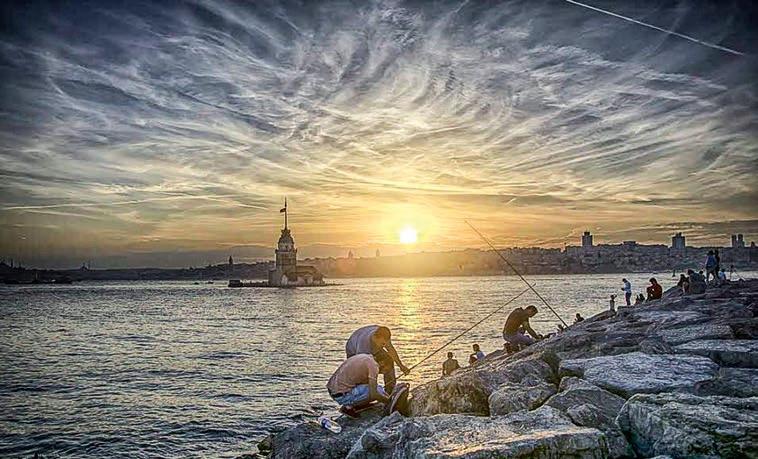
have a number of interesting possibilities. The Ministry of Commerce of Turkey is now carrying out extensive work in or‑ der to ensure the further development of economic ties with Belarus. And we soon expect the results of the research work that this ministry is carrying out. And the task is to reach new levels of interac‑ tion. It is very important that not only the public sector, but also private business be also involved in this work. One of these organizations, involved in trade and eco‑ nomic cooperation between the countries from the private sector, is the Council on Foreign Economic Relations (this struc‑ ture is known as DEIK). The head of the even surprised me in a good way. For ex‑ ample, I visited the High Technology Park, the “Great Stone” Park, one of the TurkishB elarusian business forums in Mogilev. In my opinion, creating HTP, Belarus has created for itself its Silicon Valley. Turk‑ ish firms should certainly be aware of the opportunities offered by HTP. The devel‑ opment of trade and economic relations is one of our main priorities. And we are interested in developing not only trade, but also mutual and joint investments as a more stable form of these relations. Our aim is to develop such cooperation, which will be based on the principle of mutual benefit (win -win). Because we believe that this kind of work brings a long-term result. A collaboration in which only one party is a beneficiary has no future. We are also interested in working together to en‑ ter third markets. Today, there are 250 for‑ eign representative offices of the Republic of Turkey in the world, and our country ranks fifth in the world by this indicator. Almost every country has our representa‑ tive offices. I can give such an example. In the city of Kirikkale, near Ankara, a joint investment project Turkey, Belarus, Azer‑ baijan was implemented: the production of tractors “Belarus” was set up. Moreover, this production is export-oriented and has the prospect of entering the third markets. This is an excellent example of coopera‑ tion, and we would like to increase the number of such projects. I see a number of valuable opportunities for cooperation with Belarus in such areas as IT, petro‑ chemistry, defense industry. Agriculture is also a very important area. I would like to note that you have the highest quality products. You have accumulated a lot of knowledge, technologies and organiza‑ tional skills. We have a lot to learn from you. — Turkey, of course, is interesting for many Belarusians as a “country of four seas” because we do not have sea resorts. What do you intend to do to make holidays in Turkey even more attractive for our citizens? —Of course, both culture and tourism are also our priority areas for cooperation. I attach particular importance to tourism. After all, thanks to this sphere, both Turks and Belarusians interact directly, and at the same time they get to know each other better… — And they even create families… —(smiles) Yes, there are mixed Turk‑ ish -Belarusian marriages. We are very pleased that Belarusians have so many multifaceted interests in Turkey! At the same time, our cooperation in the tourism sector can be even more effective. I already see that the situation can be improved due to the cheaper air connections directly be ‑ tween Belarus and Turkey. So far, many flig hts from Belarus are made through the airports of neighboring countries, they
are more attractive in price. And many complaints have already been received during my stay here about the high price of air tickets. Moreover, both Belarusians and Turks complained. They give exam ‑ ples that through Kiev, Warsaw, Vilnius i t is cheaper to fly to and from Turkey. So cheaper tickets could have a positive im ‑ pact on inbound tourism to Belarus from T urkey. The flight lasts 2–2.5 hours, and many Turkish citizens could plan an inter ‑ esting, exploratory trip just for the week‑ end. And someone will definitely come b ack for a longer stay. Turkey has an inter‑ est in Belarus, but there should be more. B ecause such a beautiful country, in which there is order and cleanliness, which is safe and has unique features cannot but interest foreign tourists. Interest in it will increase in Turkey. As an ambassador, I will do my best: I will try to work out this issue with professionals from the tourism sector, with other interested parties to decrease prices on airline tickets. Yes, Turkey has beautiful coasts — the Mediterranean, Aegean, as well as the Sea of M armara and the Black Sea with famous resorts. But Turkey is also a country with a rich history, with a large number of other attractive places for tour ‑ ists. I have managed to see a small part of i ts of its sights. — And how attractive your mountains are! So beckoning! But we only passed them by… — N o doubt, the mountains are beau‑ tiful: they are charming on the Black Sea coast, on the Aegean, Mediterranean coasts. Undoubtedly, Ağrı (Ararat) is also characterized by its unique beauty. But, I note, although the territory of Belarus is smaller than Turkey, it offers tourists a lot of interesting things to see, get fresh emo‑ tions, impressions. To better get to know them, I plan to visit different places in Belarus, including the smallest villages. I think it will be very interesting for my family as well. — We hope you all get a lasting impression from such trips. — Everything that needs to be done so far has been restrained by the spread of the coronavirus. Because of this, we will have to wait a bit. But I set myself the task: in the field of tourism to realize the priorities we’ve mentioned. As you know, in Turkey there are more than 80 million inhabitants. Belarus is a friendly country for us, and it is important to give Turkish tourists the opportunity to get to know it better.
There is another important area of co‑ operation: medical tourism. A significant development of this industry has recently taken place in Turkey. People from Euro‑ pean countries, from America come to Turkey to get the necessary treatment, and maybe to have surgery. As well s to have a rest. At the same time, Turks who would like to improve their health will find it use‑
The economies of our countries are complementary. And for each other, they have a number of interesting possibilities. The Ministry of Commerce of Turkey is now carrying out extensive work in order to ensure the further development of economic ties with Belarus. And we soon expect the results of the research work that this ministry is carrying out.
ful and even necessary to come to Belarus. Since Belarus is the lungs of Europe, there are many rivers and lakes with clear wa‑ ter, clean air. People, having changed their usual environment, can be filled with en‑ ergy, renewed. Your country just needs to be better promoted in Turkey, to be intro‑ duced to my compatriots more deeply. — We know that Turkish companies have reconstructed some hotels in Minsk, including a hotel near Dinamo National Olympic Stadium, as well as the famous five-star President Hotel. Do you think Turkish investments can be expected in further development of the tourism sector in Belarus? Or other areas are more attractive to your investors? —Time will show. In the meantime, I know for sure that Turkish enterprises are interested in investing in such areas as energy, construction of roads, and waste treatment facilities. That is, in the implementation of infrastructure pro ‑ jects. Turkish construction contractors a re well known in the world, they take the second place after the Chinese. If you look through the reports of the World Bank, the European Bank for Recon ‑ struction and Development, you will see t hat Turkish companies in international markets and facilities constantly confirm their competence. As you know, the Turk ‑ ish business invested in one of the mobile o perators in Belarus — Life company. In Belarus works one of the pharmaceuti ‑ cal companies of Turkey — Nobel. There a re two companies that I visited during a trip to Mogilev. True, they should rather be called Turkish-Belarusian. These are BelEmsa company — manufacturer of diapers under the brand “Senso Baby” and personal care products, as well as Seçil Kauçuk company, which produces a variety of rubber seals. I also visited “Mogilevkhimvolokno” enterprise and I am sure that this company can have an excellent cooperation with colleagues from Turkey, which are engaged in the production of similar products. I have no doubt at all that, traveling around Bela ‑ rus, visiting its cities, I will also see those o bjects that will benefit from coopera‑ tion with Turkish partners. I have already t alked about the example of the assembly production in the city of Kırıkkale as a successful investment project of Belaru ‑ sians in Turkey. I’ll also add that in Sinop, o n the Black Sea coast, a joint investment project was implemented to produce children’s toys Polesie. Of course, the number of such successful joint projects will grow. And, as my father used to say, where trade develops, there are also some disagreements. And we also have some difficulties associated with the activities of these firms and companies. But I am convinced that it is through dialogue and thanks to a constructive approach and a desire to understand each other that we can resolve all these issues. —We hope that successful work of the existing enterprises will contribute to the emergence of new joint projects…
—Undoubtedly, it is so. After all, in‑ vestors around the world are quite cau‑ tious, even fearful. And seeing success stories in Belarus — both with Life and others — Turkish investors will more eas‑ ily enter the Belarusian market with their projects. — What steps have you taken to develop cooperation in the field of culture? — On e of my first contacts in Belarus was actually contacts regarding the devel‑ opment of cooperation in the field of cul‑ ture and art. We have plans and projects for the future related to the presentation of Turkish documentaries in Belarus. We have already begun working on the is‑ sue — we are in contact with interested departments. I am also convinced that it is necessary to acquaint Turkish viewers with Belarusian film works. Especially with films that were shot in Belarus about Belarus, including films regarding the events of the Second World War. I already managed to watch some of these films. I want to see others. They also need to be shown in Turkey. — Does the embassy plan to establish “literary bridges” between Turkey and Belarus, contacts with Belarusian publishers, translators? — Personally, I attach great impor‑ tance to literature. I like books, reading v ery much. And although in our time so‑ cial networks come to the fore, I still want t o believe that the book is important, will not lose its value but will retain it. Soon af ‑ ter my arrival in Belarus, the Minsk Inter‑ national Fair and Exhibition was held here. W e took part in it. And in the future we want to expand, to improve the content of our work in this direction. That is why one of my first meetings here was to meet and communicate with the Information Min ‑ ister, distinguished Alexander Karlyuke‑ vich. In my opinion, the peoples of the two co untries are not yet sufficiently informed about each other’s literature. Few transla ‑ tions of books have been published. In 2021, w e intend to participate in a big exhi‑ bition fair with a bigger stand, as well as to in vite poets and prose writers from Turkey. In 2022, we would like to participate in the exhibition as an honored guest. The work has already begun in this direction. Of course, the role of publishers, translators, writers is very important in this field of ac ‑ tivity, the doors of my Embassy are always o pen to them. We are open to dialogue to implement joint projects. —Is there a large Turkish diaspora in Belarus? Does the embassy and its representatives have joint cultural and educational projects? —Previously, I worked at a consulate in the German city of Hamburg. There, the number of Turkish citizens in the country is 120 thousand. Here according to our records it is about 625 people. But there are more and more Turks here, and this is especially promoted by mixed marriages, as well as children who are born in such families. So life pushes us to develop in‑ teraction in the cultural sphere and in the sphere of education. There is a pre-school institution in Minsk — a preprimary school, on the basis of one of the groups children are taught Turkish. But we see that one group is not enough. It is neces‑ sary to open more. And we already need a class in an elementary school, where edu‑ cation will be conducted in Turkish and Russian. — D o you plan to create language courses at the Embassy? — A p roject to teach the Turkish lan‑ guage on the basis of one of the private
Mr. Mustafa Ozcan and his family

schools is currently being implemented. The Embassy is partly involved in this matter. And perhaps we will enlarge this project. There are a number of teachers who have been sent here from Turkey. They teach Turkish at a number of uni‑ versities. Perhaps over time there will be more. — What do your local compatriots say about life in Belarus? —The diaspora is not numerous here. Our people are well integrated into the Be‑ larusian society, respect and like it — and in return they enjoy love and respect. And I, as Ambassador, am lucky, because there are no difficulties, issues related to the life of the diaspora, which would require my involvement. And if I recall all the diffi‑ culties, issues that I had to solve in other countries, it would take a lot of time. Here the diaspora is involved in cultural activi‑ ties. Not so long ago, a commemorative event dedicated to important events in the Republic of Turkey was held at the Minsk State Linguistic University. The diaspora also actively participated in it. A num‑ ber of other projects have been planned, the purpose of which is to introduce our country to Belarusians. I take this oppor‑ tunity to invite you to these events in ad‑ vance, I will be glad to see you.
Thank you for an interesting interview.
By Ivan and Valentina Zhdanovich
On the fine line o f being
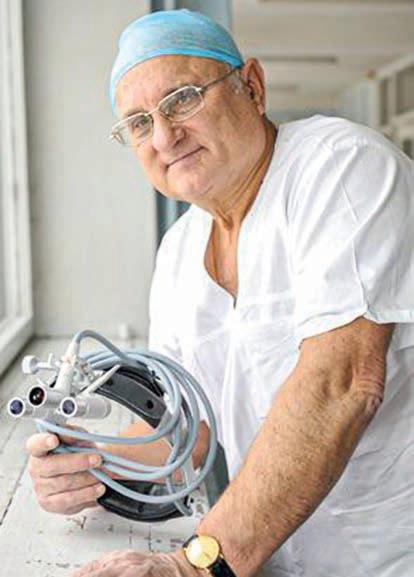
In the life of a positive person there is always room for miracles, that’s what Arnold Smeyanovich, a talented neurosurgeon is convinced of. His great life experience allows him to say so. It’s a miracle that he, a child of the Great Patriotic War, stayed alive.
We began our conversa‑ tion with his memories of his father, a front-line soldier, guards major, about everyday life un‑ der occupation, about family roots and small motherland. It was a natural con‑ tinuation of a meaningful conversation about the mysteries of the brain, about the role of psychosomatics in our lives (No. 11–2018). This time we will deepen our acquaintance with this unique person, who is a practicing physician at the age of 82. In addition, Arnold Fyodorovich man‑ ages the neurosurgery department of the Republican Scientific and Practical Center of Neurology and Neurosurgery. He has a clear mind and is amazingly friendly in communication. It’s a great pleasure to talk to him. After all, everything he talks about is colored positive. Isn’t it a miracle?
About father, about the war and small motherland ✓ My father Fyodor Smeyanovich was a paratrooper during the war. He com‑ manded the 31st airborne regiment. He landed on the Small Land and later, when landing in the battle of the Dnieper, near Kanev, died in September 1943. He was the chief of staff of the brigade. A picture of my father is on my desk under glass — every day it is before my eyes. I was 5 years old when he was gone. And the photo was taken a month before his death. The pho‑ to shows my father in the centre, and his comrades, his aides. They survived. I met them 15–20 years ago. ✓ Did I go to my father’s grave? Yes, I did. It’s a common grave. After our ser‑ vicemen died, that place stayed invaded by the Germans for another month. Their defense wasn’t broken through. Our guys were parachuted, but the landing failed: it was too high. So they couldn’t land quick‑ ly. The parachutists were raised even high‑ er by the air flow and they were shot down. Dad landed. He had a Mauser with him: since Khalkhin Gol, where he had fought. So the aides heard my father shooting. And then there was silence. The Germans were shooting machine guns. And then the only shot was fired, and silence came again. Those who survived were captured there. They said the paratroopers would all be shot out. One of my father’s regi‑ mental comrades, who had landed with him, thought: I’d better die here. He got
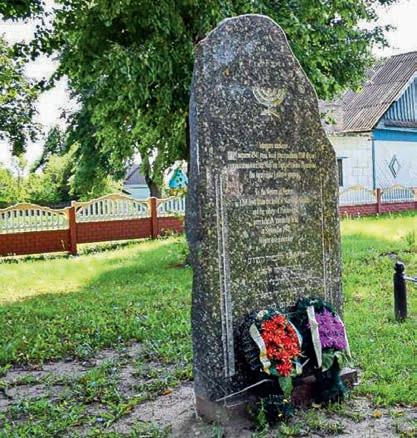
under a snag and disguised himself there. His comrades were taken away, and he lay there for a day. Then crawled out at night and saw my father’s corpse. That’s what he told my mother. Unfortunately, I can’t re‑ member his name. ✓ According to my mother, I know that my father studied at the Frunze Acad‑ emy before the war. And in the summer o f 1941 we came to Pukhovichi to visit his grandparents on vacation. And 10–15 days
before the war my father was urgently called back to the academy. He then said: “Galya, stay here because there will be war.” ✓ I remember how my mother was arrested. The Germans gathered all of us just before the attack of our troops in 1944, when Belarus was being liberated. The men were kept inside. The women stayed outside, behind the wire. The children were let to go. Bought them out somehow. My grandfather came for me, so they let my sister and me go. ✓ Our troops were attacking from the side of Osipovichi, Lapichi. The Germans, as they say, had disappeared, and we were guarded by policemen. Experienced old policemen went to take their families out. And the young ones stayed, they didn’t know how to escape. There was a wise woman who said: let’s run. What are we waiting for? She and 10 other people ran away — there was a rye field nearby, and they hid themselves there. Including my mother and my aunt — the wife of my mother’s brother. And those who stayed were killed by the policemen. At first a police brigade arrived. They made men and women walk 2–3 kilometers to Lubin, drove them into a barn and burned them. My uncle was among them. ✓ Of course, my mother knew nothing about the fate of my father: it was a Ger‑ man occupied territory. And in 1947, she r eceived a notice that my father had died, missed in action. Mom went to Maryina
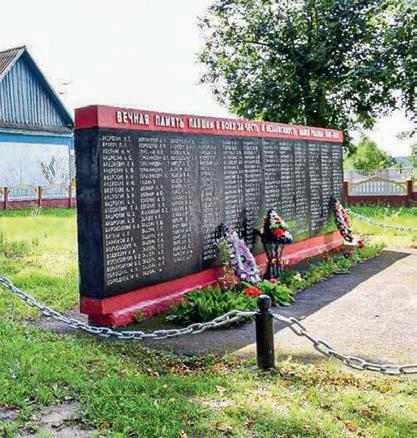
Gorka. And on the way she met two offic‑ ers. She asked them: do you know this unit? Th ey said to her: “How do you know it?” As it turned out, the officers were just from the unit, which that strange woman was asking about! They must have thought the Lord knows what! But it just so happens that for a while a unit of my father was sta ‑ tioning in Maryina Gorka. And my father’s f riends were already heroes. A general even came to us, to my grandmother. They also brought a soldier, who told us what he had seen. I tried to find my father’s grave then, but how could I find it? For a month, while the Germans were there, they buried dead bodies and made a common grave. And soldiers, officers, apparently, were not iden ‑ tified. I put flowers at the monument. ✓ I often dreamed about my father. And I woke up with the feeling that he was happy: his son had became a doctor, managed to achieve a lot. I don’t remem‑ ber much about my father: I was too small. The only thing I remember clearly is the way we were seeing him off to Maryina Gorka. It seems to me that it was already dark, evening. And my mother told me that it was a sunny day. Perhaps different memories overlapped. I wouldn’t let my father go, held him so tightly. So one of our neighbors hit me with nettle, so they took me away from him. And he and mom walked together a little. He took the train, and was gone forever. ✓ I remember the war in fragments. One of them: In 1941, the Jews were driven down the street. And the Jews were all fa ‑ miliar. Pukhovichi was a shtetl before the w ar: a lot of them lived there. My grand‑ mother and I went outside to see. So the G ermans pushed us into this column too. And the neighbors screamed: not juden, not juden! Grandma was hit on her back with a buttstock and kicked out of the col ‑ umn. And we stayed. As people say, we w ere within an inch of life. And in that column among others there were grand ‑ parents and an aunt, maybe an uncle, I do n ot know exactly, of Mikhail Turetsky. The one who is the head of “Turetsky Choir”.
Fyodor Smeyanovich in the photo — in the center. July, 1943
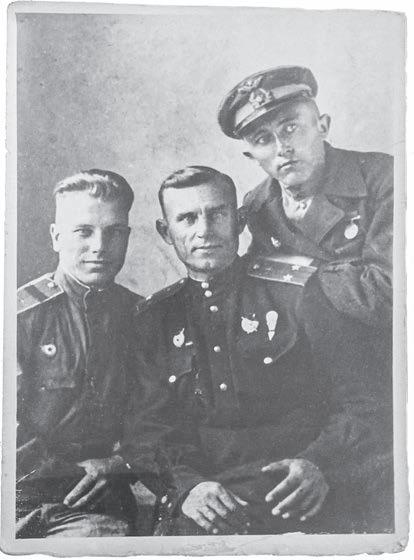
And a hole was dug 300–400 meters away. All of them were shot down there. ✓ My grandmother had brothers — we were friends with them. I had an elder sister, she is gone. After the war my moth‑ er married a local man Pyotr Fyodorovich Linsky, a front-line soldier… And I have a brother, he’s 10 years younger than me, lives in Pukhovichi. Pyotr Fyodorovich’s first wife was Jewish. During the war, their neighbor became a policeman — and Pyotr Fyodorovich’s children were shot dead. ✓ My connection with my small moth‑ erland is strong, although I was not born in P ukhovichi. My father was a military man, my mother used to go to towns with him. But I see Pukhovichi as my motherland. My relatives are all from there. My maternal grandmother Olga Ivanovna and grandfa ‑ ther Luka Semyonovich Dunay participat‑ ed in my upbringing. And, of course, I was p unished with a rod. My father’s parents died early. Even before my mother married my father. Mom had never seen them.
The monument to the victims of the Holocaust in Pukhovichi, erected by the Simon Lazarus Foundation near the village council building in 2018. Photo by L. Smilovitsky. August 6, 2019.
✓ My mother, Galina Lukinichna, had secondary education. She worked as a communications operator in the post of ‑ fice. And during the war she, wife of a com‑ munist and Red Army officer, was a parti‑ san communication agent. I remember a y oung teacher from the village of Glushka came to our house. She was also a commu ‑ nication agent of the partisan detachment. On ce we talked to Academician Vladimir Kulchitsky about life, so he said: his moth ‑ er was a teacher, and lived in the village of G lushka. I couldn’t ask my mother about it anymore, but most likely it was Kulchit ‑ sky’s mother. The Germans were conduct‑ ing a raid and we hid her at our place. So, m y and Kulchitsky’s life-paths crossed.. ✓ I was lucky to have good teach‑ ers. Galina Feofanovna taught German, Lev Ivanovich Pilotovich — the Belarusian language. I remember Yakub Kolas driving through our village — he had a summer house in Balachanka. His chauffeur was driving “Pobeda”. The classic used to go mushroom-picking. He came to us, spoke the native language with us. Yes, and my school friends are also the best. Everyone got a higher education. They’re pensioners today. Our goal in life was to learn. I read a lot since school. Everything I could bor‑ row from the school library. By the way, we were taught in the Belarusian language at school. Here, in Minsk, I had to tbrush up Russian: even then, in the 50s, every‑ one spoke Russian. And I still like to read. I also like the statements of great people. Under the glass, next to my father’s photo, there are some I like most. ✓ I wanted to be like my father: a pilot or paratrooper. I thought dad was a pi‑ lot. Mom didn’t really know. She said, he was flying a plane. In the 8th form I had to start wearing glasses. How could I be‑ come a pilot. And my grandmother used to say since my childhood: you’ll be a physician, a physician. The guys went to polytechnic, and I went to medical univer‑ sity: my grandmother recommended it. My goal was to become a surgeon. When we graduated from the institute, we were general practitioners, including sanitation physicians. No specialization! My fellowstudent from Dribin had a vacancy of a surgeon. Tamara and I got married in the 6th course, and at the placement of graduates I asked to send me to Mogilev regional health department. And there, in Dribin, we worked for 3 years. ✓ There is still a house in Pukhovichi. I gave it to my sister. By the way, there is an interesting life situation. One of her sons is serving in Lvov — he’s a colonel of foreign intelligence. And the other was a general here, now retired, he was incharge of intelligence of MID. And because of the current political situation, let’s say, the brothers can not meet. If the one from Lvov comes, the Russians will arrest him. And if ours goes there — so he’s also con‑ nected with foreign intelligence. ✓ My house is 20 meters from my sister’s house. When my mother was still alive, she used to say: build a house, Petya will help you choose good wood. Well, this is my classmate, he was the director of a cardboard factory. Petya responded to my request. The guys organized arranged every ‑ thing, dug a hole for the foundation. Th at’s how we put the house together. And next door, there lived a neighbor alone, in a poor house. When she was gone, my mother said: buy a plot of land for the cottage. So, we did and built a cot ‑ tage there too: it’s my daughter’s place today. A nd it’s all ours. This is our small homeland! And my brother and nephew have their own house and land. My wife loves to grow flow ‑ ers. We, I joke sometimes, come to Minsk f rom Pukhovich to rest. Because there is so much work in the village! When there are many apples, I sometimes take 20 barrows full of apples to the swamp. Far too many. If they are not taken away, the soil will get sour. So my small homeland is always with me. And I’m in contact with my family all the time. ✓ My mother was from the village of Puhovichi, and my father was from the next village of Turin. Our last name used to be Semyanovich. And in the 1920s her father and cousin changed their surname to Smeyanovich. Why? After the revolu‑ tion in the USSR the upper class people were persecuted — they were consid‑ ered to be “class enemies”. In the 20s they were exiled “because of their origin” and thus some people, having left for another area, avoided the persecution by chang‑ ing their last names. There lived a Kazi‑ mir Semyanovich. Have you heard of this military engineer? He wrote a book “The Martial Arts of Artillery”. So, there is in‑ formation that Kazimir Semyanovich was from an impoverished princely family from Vitebsk region. And my father told mother that his family, our family came from there. ✓ On the mother’s side, my family is Ukrainian. Mom’s father, my grand ‑
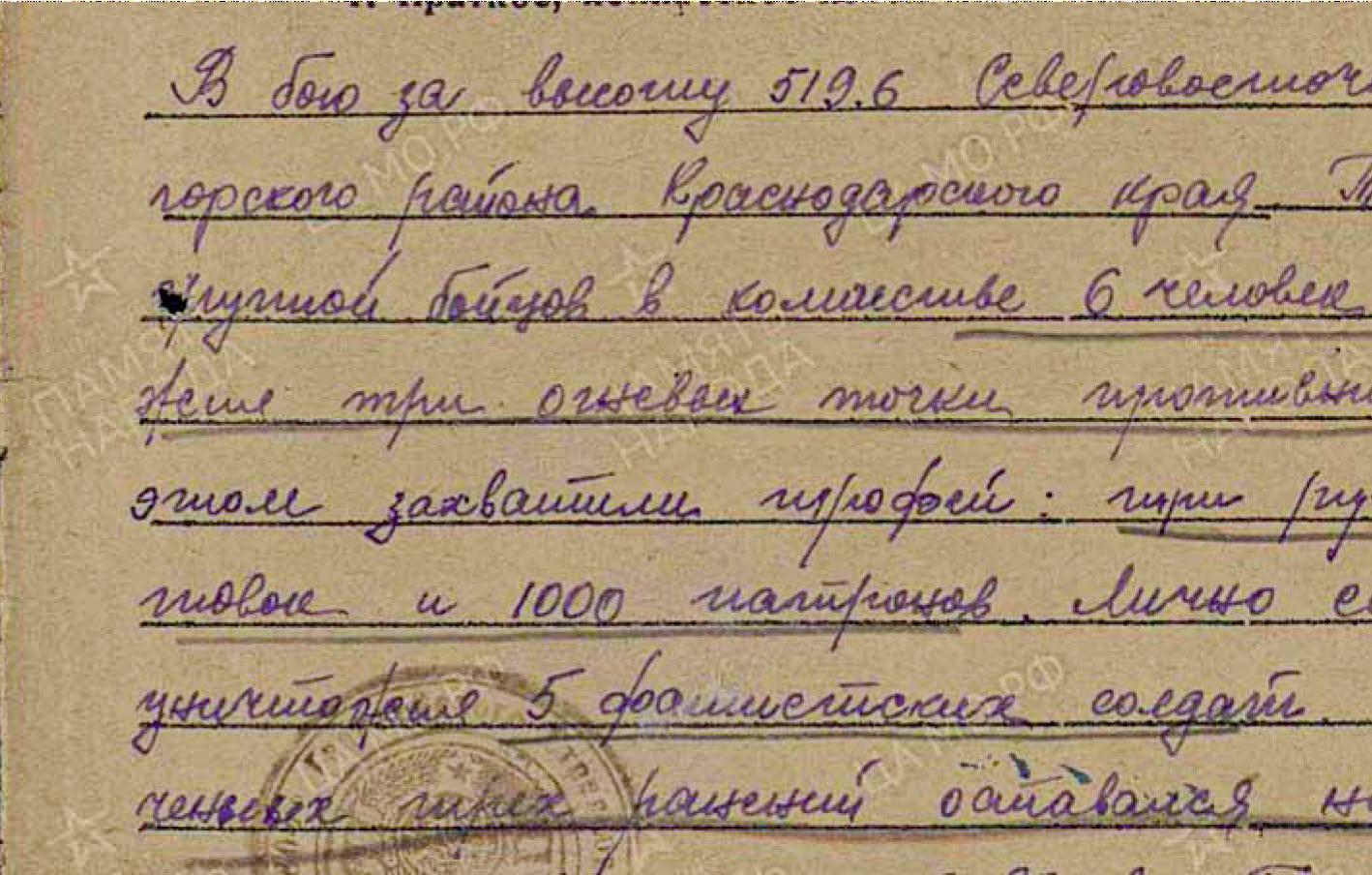
father L u k a , w a s Ukrainian. He was from Sumy region. Grandmother was from Belarus, from the bourgeois class, as they used to say. My grandfather was cap ‑ tured by the Germans during the First W orld War in 1914. He was a junior officer. One can say that grandfather was lucky to be a prisoner before the revolution. He told me a lot about his life. How he worked for his German master. He said, the German was a decent man. He suggested to my grandfa ‑ ther: you, Luka, go, take your family — and b ring them here. I’ll give you a piece of land. You will live in Germany. So, grandfather went, and here there were either the Ger ‑ mans or the Poles. Anyway, the invaders. So h e had to hide away. And soon the Soviets came. Already in Soviet times, he was de ‑
prived of some civil rights. But fortunately, he wasn’t deprived of his life. ✓ I found my family roots in Sum‑ shchina. Grandfather’s brother came. My mother’s cousins, brothers. Over the years, unfortunately, these ties do not strengthen but weak‑ en.
If you’ve become a doctor, serve the people. Follo w up conversation.
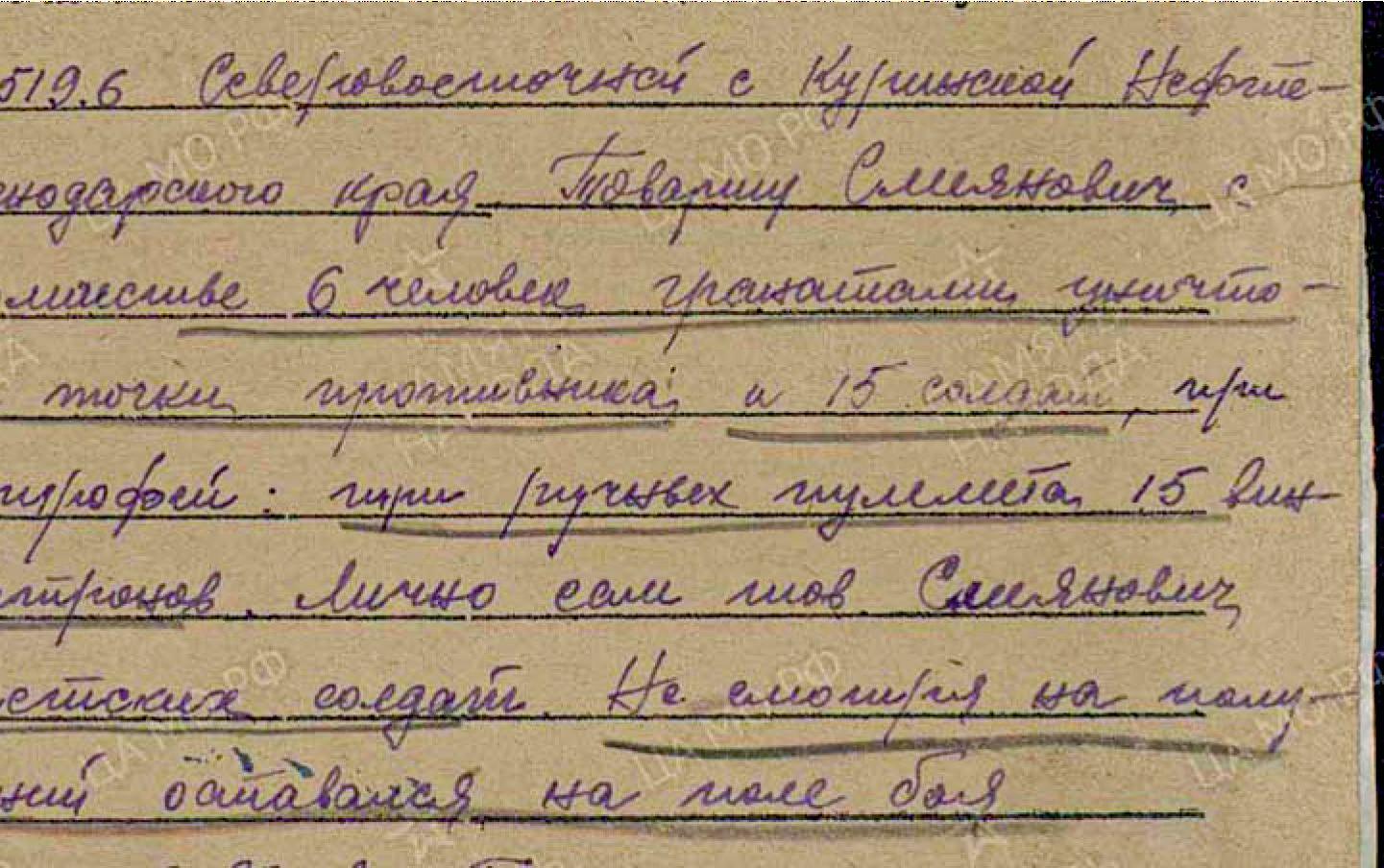
—Have you, Arnold Fyodorovich, ever had a chance to watch a man’s character and habits change after his illness? —Diseases have an impact on a per‑ son’s character. Everybody knows about it. But there’s still a lot we don’t know about brain diseases. We can only say that we know the hidden causes that lead to such diseases. But this is not the knowledge that will help solve problems in the near future. Because there are so many varie‑ ties of brain tumors! From benign to ma‑ lignant. A long line of varieties: about 200.
We have one institute that deals with such problems, and in the United States, for example, there are about 20. There is a huge army of specialists working all over the world, but so far there are a lot of ques ‑ tions in this area. When I was a student, w e were told: by the end of the twentieth century, the problem of treating malignant tumors will have been completely solved. And now it’s the 21st century, and soon it will be a quarter of a century…
Reading the works, research of col‑ leagues, we arrived at an interesting idea. A great research work was done by my dissertator Tatiana Zhukova. As a result she defended her doctorate thesis. She is a neuromorphologist. And while studying malignant tumors of the brain, she no‑ ticed that they contain a virus of herpes simplex. You know, the one we have on our lips sometimes. She noticed that

where there is a virus, the vessels grow especially fast. And if they do, so does a tumor behind them. And we, reasoning over these relationships, came to the con‑ clusion: if you oppress, press this virus, which is usually every person has, and al‑ most everyone who has a malignant brain tumor, as a result the growth of blood ves‑ sels will stop. So the tumor does not in‑ crease: this process slows down. We have started to treat such patients with antiviral drugs — and we see good results. Before, after the removal of the malignant tumor, patients receded after 7–8 months, well, a year at the most. And today it’s been a few years and there’s no relapse. This, of course, is not a global solution to the problem, but one of the promising op‑ tions. — Let me give you a little consideration on the topic. In St. Petersburg t here is the firm “Allofarm”, its founders are Doctor of Biological Sciences Sergey Chernysh and his daughter, biologist Natalya Chernysh, our compatriots: her maternal grandfather Egor was born in Belarus. http://allopharm.ru/We read on the site: “The company is engaged in search, development and commercialization of new medicines, the prototypes of which are active components o f the immune system of insects, with antiviral, antitumor and antibacterial effect”. In addition, Sergey Ivanovich is the head of the laboratory of biopharmacology and immunology of insects of S t. Petersburg State University, he has long studied insects. He has also studied the so-called effect of “surgical larvae”, which is known, as the company s ays on its website, since the Crimean War, Napoleon and N. I. Pi rogov. As it turned out, in the treatment of complex wounds “surgical larvae” can do without antibiotics at all. In the era of superbacteria, it is difficult to overestimate t his feature of the larvae. And in 2011, the French biologist Jules Hoffmann was awarded the Nobel Prize in Physiology and Medicine for “work on the study of the activation of innate immunity”. His research was based on the study of the insect immune system. And now in St. Petersburg they’re making unique, patented drugs. There, scientists managed to decipher the antimicrobial complex of “surgical larvae” and develop the t echnology for its production. However, other researchers are inclined to see the relationship between cancer and weakened immunity. One can even imagine: s ome place, or an organ in the body is weakened energetically — and chaos breakes out… It’s like a house where the owners don’t keep order… — Thank you, interesting informa‑ tion. Apparently, you’ve been talking to oncologists about these issues. And they know that malignant cells are cells of the body itself. And we always have them. What are they? Let’s imagine: there’s a young, unshaped cell that can begin to reproduce. When a cell has served its in‑ tended time, others take its place. But sometimes this mechanism is broken, which in young years used to work in our body without failure. And the young
. b y
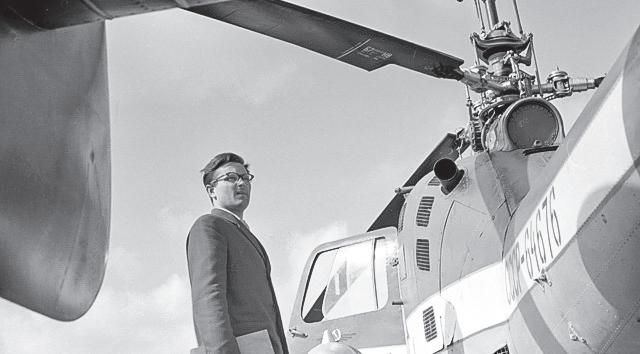
m e dv e s t nik
Arnold Smeyanovich, while working in Dybin with ambulance aircraft, visited many parts of Belarus, rescuing patients. September 1966.
cell begins to reproduce uncontrollably, and its offsprings grow like a snowball… — …A kind of anarchy. Growing without taking into account external circumstances, without looking at the needs of the organism as a whole — it’s vigilanteism. Some kind of selfishness on the cellular level… —It’s true. Sometimes the body turns on some of its mechanisms and destroys these unnecessary foreign cells. That’s how we rid ourselves of malignant tumors. We also have benign tumors, so they develop a little differently. All of this has to be studied. There are peculiarities in the structure and functioning of the nervous system in each of us. And for the people of different psy ‑ chological types they are different. Howev‑ er, this is more a question for physiologists t han for neurosurgeons. I once said: looking at the open brain, if the rest of the human body is covered, it is impossible to conclude who is lying before you: smart or stupid. Of course, you can tell the difference between races by the skin-color. But not by the brain. — What do you think most often causes the problems you deal with? Inheritance? The environment? Upbringing? Ecology? What exactly leads to them? — It’s hard to say. Different diseases. There are hereditary problems, too. I’m go‑ ing to do surgery right now, there’s a vas‑ cular tumor. It’s in the cerebellum. Her dad a nd her sister had it, too. There are cases when father or mother has a tumor and it appears in their children with time. —Are there any areas with “pathogenic zones”, the most unfavorable? — I’ll tell you the truth: even after Chernobyl, we haven’t noticed it. I mean, that after Chernobyl in some Chernobyl areas there was a localization, the most frequent occurrence of the problems we deal with. It had happened before. But now we have a different diagnosis. There are more resources to identify the prob‑ lem today. Say, CT scans are a big help. And a nuclear tomograph — almost every clinic has one. We have two. Naturally, the bad environment affects our health — but that’s not the main reason, I think. Nei‑ ther is a certain social environment… —So both the son of an academician and the son of a poorly educated homeless person are equally at risk of getting a brain tumor? —Yes, kinship with the academician does not give their offspring any advantag‑ es in this respect. Yeah, someone’s lucky. Somebody’s not… —By the way, since when have you been an academic? —Since 2006. —How do negative emotions affect human health? —Based on the people’s wisdom and my life experience, I can say without sci‑ entific experiments: pride, anger, resent‑ fulness are definitely bad qualities. For everyone. I think that in any case it is due to a disorder, inadequate, ineffective func‑ tioning of the nervous system, which has a very negative impact on our entire body. It endangers both physical health and life. All the negative attitude that we carry in‑ side us, and spill out, reduces our chances of survival. The one who is full of these qualities is more susceptible to different diseases. A good person is less susceptible to disease than an evil one., dissatisfied with everything, who always lacks some‑ thing and takes offence. You can only take offence at yourself — and not for long. It’s better not to take offence at yourself. — What is the soul? Sometimes they say: the soul hurts… — It’s hard to understand. I don’t think it is located in a definite place, and certainly not in the brain. It may have some ‑ thing to do with the heart… Although the h eart is more of a pump pumping blood… — Do your patients share what they have seen in the other world? —Yes, sometimes they do, there have been cases. They describe a flight through a black tunnel. And then after a while a person comes back, and feels very easy. And I, by the way, experienced this feeling to some extent when I was sick. It was as early as in my childhood: as if I was flying high. True, at that time I did not under‑ stand anything, only later, over the years. I had a high fever, it was as if I had got out of my body and saw myself lying down. And was flying. I remember this feeling. I didn’t understand it. I told my mom about it, I asked her why I had been flying. She told me: your had high temperature. — Is there room for miracles in your practice? —Yes, there is! I have even heard such an optimistic expression: there is always room for a miracle in the life of every posi‑ tive person. Of course, we have had some hard cases. You can’t help a person, and it seems that everything has been already done, but he or she comes out of this state. And when you are sure that everything is okay, you see that the process doesn’t go the way it should, as you want it to be. I also noticed that when the patient says “I will not undergo surgery”, we should respond
to it. Of course, I encourage such a per‑ son, it’s okay to say it’s not a big deal, you have a small surgery. And they still do not respond to my positive message. And it’s true… Either they feel their destiny, or set themselves against. The operation seemed to go well, but the patient is falling away to nothing… And leaves. And sometimes the patient comforts me: don’t worry, doc‑ tor, I’ll live. But this s a very difficult case. You remove the tumor and think it’s all for nothing. And then you watch him recio‑ vering. And he lives! — So a lot depends on psychosomatics, too? — Absolutely, that’s right. It’s much easier for an optimistic person to go through the ordeals of life. It’s easier for the optimist to endure all severe situ‑ ations, diseases, complications. People learn from mistakes. But it’s better, really, to learn from others. — We know that your son Vitaly works here, too. And how did that happen? Children don’t always follow their father’s footsteps… — And my son wasn’t going to do it. Although he studied at medical unversity. After graduation he was sent to hospital N 5. And I was also in the same hospital, so we got closer. And my grandson is also here: Stanislav Smeyanovich. My elder daughter, Olga, is also a physician, a dentist. She is the director of the dental clinic on Zakharova Street. She worked there for 20 years. The staff liked her. Another one was about to be appointed — but the will of the people won. —Is your wife a physician too? —Yes. Tamara Ivanovna was an oto‑ laryngologist. She and I are studentmates. I’m joking with my grandson now: I’m your grandmother’s husband. — What is the situation in your RSPC with equipment? — You know, absolutely everything has changed here. I once told the Presi‑ dent: I want to work in a new clinic where all the equipment is modern. —Has the most modern equipment been installed? —Yes, an operating module was built here five years ago, and the equipment was the most modern at that time. Foreign guests came, they felt jealous. The MRI scanner is not far — it’s always possible to use it. For example, you’re going into surgery, and the tumor is not visible. A patient is transported on a trolley there — and you can use it. There is navigation. During the surgery, you can examine in which direction the tumor lies. It’s possible to televise: you can consult from a distance. There is endovascular surgery — it’s when hrough the femoral artery we enter the an ‑ eurysm without opening the skull. There’s n o need for open surgery. Students can see on the screen how it’s done. We used to put a plastic plate after the surgery, now it’s titanium. We model it with 3D. A nd the plate is printed on a 3D printer…
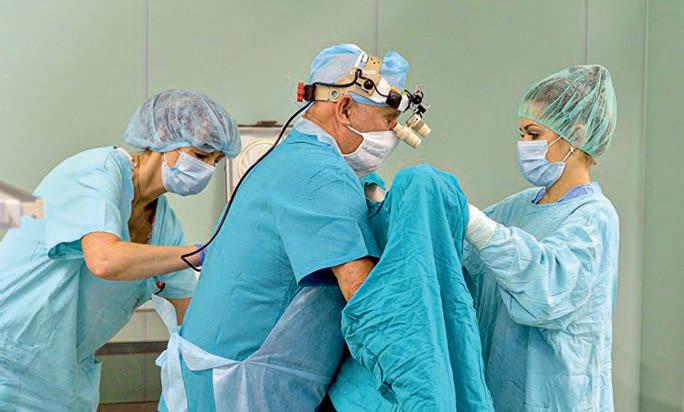
—What else is new in Belarusian surgery? — A lot of things! You see the re‑ ports on TV. My colleagues do the most complicated surgeries And not only my colleagues! Let’s say, a robot-surgeon ap‑ peared in the building of the State institu‑ tion “Republican clinical medical center” of Administration President of Belarus (Lechkomissiya) in Zhdanovichi.
It removed the gallbladder. It’s doing in‑ testinal surgery. The machine works, and t he surgeon watches over its work. Beyond our western border, they already have it. But I’d like to be in demand for now. But we can’t stop the progress. In about 10 years, I think robots will perform operations. But these are expensive technologies. — Do you cooperate with the Institute of Physiology of the National Academy of Sciences of Belarus? — Yes, and with Kulchitsky’s stu‑ dent — Yury Shanko. We have the fol‑ lowing topic: brain protection against is‑ chemia. That is, treatment with stem cells of ischemic brain damage. On all parts of the brain, which suffered during the clog‑ ging of blood vessels — ischemia, heart at‑ tack — cells die. We need to restore those functions. Yury Shanko has developed a methodology, he is our deputy director for scientific work. This is my pupil, too. And my son is the head of the 1st department, I am the curator in the 2nd. On Fridays we do general, joint rounds, we examine all th patients of the 1st and 2nd departments. — Do your fellow — countryman come to you for help? — Always, if anyone needs help. Be‑ cause everybody knows: I don’t say no to a nyone. And I think it’s the right thing to do. As long as you’ve become a doctor, you’ve chosen this path in life, you’ve got to do it. —Do you treat overseas patients, too? —Of course I do. We are open to such contacts, ready to accept more. We are ap‑ proached by citizens of Russia, Kazakh‑ stan — all CIS and Baltic countries. They look through a pricelist, choose medical services, as they say, affordable. Interviewed by Ivan and Valentina Zhdanovich


